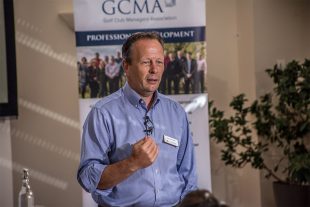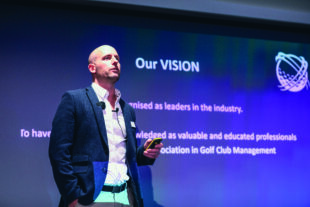Ahead of his appearance at GCMA 2021 Conference, Rain Bird’s Golf Sales Specialist for the UK, Ireland, and Iceland explains why the industry must become more sustainable…
Our climate is changing. Spells of extremely hot, cold, and rainy weather are playing havoc with sports surfaces and it’s only going to become more difficult. Increased scarcity of resources and restrictions on the use of chemicals means the golf industry must look differently at managing its most important product: the course.
Sustainability is no longer a buzzword. It’s an imperative and at the GCMA’s 2021 Conference influential industry figures will be drawn together for a panel discussion on ‘Key Issues in Sustainable Management of Golf Courses’.
Joining the likes of GEO Foundation’s Jonathan Smith, and BIGGA’s Ecology and Sustainability expert James Hutchinson, will be Rain Bird’s new Golf Sales Specialist for the UK, Ireland and Iceland, Shaun Anderson.
We caught up with him to ask what the future holds for golf courses, and how Rain Bird technologies and its commitment to ‘The Intelligent use of Water™’ could help clubs and courses proceed with confidence into a new age of uncertainty.

Would you tell us about your background in golf and how you came to work for Rain Bird?
I grew up in St Andrews so I was a keen golfer when I was younger. I went to university, studied environmental science and then realised that I wanted to be more closely involved with golf.
Not being a very good golfer meant greenkeeping was a natural vocation for me. I do believe greenkeeping is a vocation rather than a job because you invest so much of yourself in it. I went to Elmwood College and was fortunate to be awarded the Duke’s Golf Course Scholarship, just outside St Andrews, and spent a fantastic year and a half there. After my scholarship, I moved on to St Andrews Bay, now Fairmont St Andrews.
Working on the Torrance Course I was heavily involved with environmental aspects, writing the environmental report for St Andrews Bay. After a year, the opportunity arose for me to return to Duke’s.
I’ve always had a strong affiliation with Duke’s because it was the first course I ever worked on. Over four years I worked my way up to Senior Greenkeeper and Spray Technician.
It was exciting to be there during the reconstruction when Herb Kohler bought the club and decided he wanted to make it similar to Whistling Straits, its sister course in America. As part of a massive redesign, we had a Rain Bird irrigation system installed – my first hands-on installation and operational experience with a Rain Bird system.
I moved on to Forfar, outside Dundee, which gave me a ground grounding in greenkeeping. You learned from the bottom up then because there was no one else to do the job for you. Then I joined Piperdam Leisure Resort, first as Deputy, then Head Greenkeeper, Course Manager and, latterly Golf and Leisure Manager.
During furlough, like many people, I thought hard about what I really wanted to do going forward. Sustainability was always at the heart of my approach at Piperdam. We’d had combined heat and power (CHP) with biomass, solar panels and extra recycling.
We followed best practice when it came to managing many aspects of the property in a more environmentally-responsible way. When the opportunity came up, I was attracted to the Rain Bird’s ethos – The Intelligent Use of Water, and that’s what led me here today.
BOOK NOW FOR GCMA 2021 CONFERENCE
You are talking about key issues and sustainable management of golf courses in a panel at GCMA 2021 Conference. How excited are you to be addressing golf club managers on this issue?
Very! I’m really pleased that the GCMA is bringing people from across the industry together to address fundamental issues facing the golf business. And it’s not just the course – it’s about being more sustainable in the clubhouse and across the entire course estate.
We need a far wider sustainability lens that focuses on how we can work within environmental best practice, diversify our businesses, and make them sustainable for years to come.
I’m also looking forward to all the conversations I’ll be able to have at the conference. Speaking with club managers allows me to get honest feedback about the challenges they’re facing and the way they’re addressing them. Having those frank conversations is crucial. We can share experiences and find ways to work together to tackle those challenges.
It’s all fine and well saying we want to be sustainable and environmentally-focused, but when there’s a pound sign in sight, it becomes more difficult. We need honest conversations about how we move forward as an industry.

Just looking at some of the topics you’re going to be addressing shows how vast this issue is: from sustainable water use, to developing a natural environment, to integrating pest and disease management. It’s huge. How can a golf club get to grips with this, or do we need to do it as an industry?
There is obviously best practice. We follow guidance and learn from our peers. We see what some of the larger golf courses are already doing.
People automatically associate sustainability with the environment, but it’s also about modelling and maintaining sustainable businesses that thrive in a sustainable industry.
That’s what we all want, isn’t it? Courses might not always be able to follow all there is out there, but everyone can take a fresh look and look to adopt some elements. Every individual club that takes one new step or makes a change will improve its sustainability and makes a contribution to the industry’s efforts as a whole.
Yes, I think the wider point was the topic is so vast there could be tendency for clubs to say ‘there’s just too much of it’. How can the work you do with Rain Bird help clubs to become more aware and improve their practices?
Advisory bodies such as the R&A, Scottish Golf and England Golf are providing guidance and education, and representative bodies such as the GCMA are helping steward golf course managers through the challenges.
What club and course managers need next is specialist expertise, and that’s where we come in. They want to know “where do we start, and what do we need to know?”
That’s why Rain Bird offers a free irrigation evaluation to full GCMA members. The evaluation looks at the club’s water resourcing, storage, usage and application. It gives the club manager a comprehensive overview of their current situation and offers some recommendations for improvement based on the club’s needs now, and in the future.
Part of that will be the irrigation infrastructure and how the system’s used, but it could also reference water abstraction, reservoirs, tanks, reliance on mains water and energy costs. We can help signpost to experts in those fields so that clubs can explore their options and build a long-term strategy for water.
Let’s talk about water because Rain Bird is an irrigation company. We all know about the water shortages already in this country, particularly in the South of England. How difficult could this situation become?
There is a clear trend in weather patterns. It’s getting drier and warmer. We must manage the grass plant differently; make it more virile and more resistant to drought periods through intelligent water use.
Clubs must address their water risk and any reliance on potable water. In the event of future drought orders, they must be confident that they have the ability to irrigate over a sustained period of time. Future proofing not just your irrigation system, but your water resources as a whole, is an investment which will deliver an economic advantage in the long term.
And the technology is already there to make a difference?
Every single aspect of a Rain Bird system, even down to the valves, has been designed and manufactured with this in mind. Our central control systems have huge capabilities and functionality, but they are easy to use, so course managers can make significant savings and see improvements out on the course from the outset.
Real-time communication between components in the field and the control system means it reacts to changing conditions to ensure that irrigation is applied only when and where it’s needed.
BOOK NOW FOR GCMA 2021 CONFERENCE

You talked earlier about ‘pound signs’ and I’m sure for a lot of clubs if they had the resources, they would all invest in irrigation technology like yours. Will this become more mainstream or will clubs have to think more about their practices? Planting grasses that aren’t as water dependent, for example…
It’s a combination, which is why we need a holistic approach. Without a doubt, every golf course needs an irrigation system, and all clubs can benefit from Rain Bird technologies. Our most basic control system for smaller courses, StratusLT, provides many of the key water and energy saving features that our control systems for tournament venues do.
For clubs with existing systems, upgrading from a decoder system to an IC System, replacing rotors and nozzles with the latest models, and adding components such as rain cans, weather stations and Smart Pump help drive efficiency even further.
To make it affordable, there are different ways golf courses can look at financing. Planned phasing of projects enables the cost to be spread over a 5 or 10-year period. I’d ask club managers to examine the true cost of water inefficiency. How much revenue is wasted by a greenkeeper filling holes around the golf course, or inputs such as fertiliser applications that are washed away?
Water is going to become such a precious resource in the future and the cost of wasting it, in the ways we might have done in the past, will be horrendous, won’t it?
Absolutely. We have a collective responsibility to value it and use it responsibly. If you’ve got a well-designed, well managed and well maintained irrigation system, you can probably reduce water usage by 50 to 60 per cent – because you’re applying it accurately and only when you need to.
I’ve worked with irrigation systems where it was simply a case of getting the plant wet. Without accurate information we wasted a lot of money each year using wetting agent tablets and pellets, just to maintain the plant.
If we’d had a system that could actually use data from weather stations and monitor evapotranspiration rates so we knew how much moisture was lost during the day, we could have replenished it that night without doing it blindly. The technology is there now, we just need to educate and encourage everyone to use it.
What do you think the future holds for golf if we don’t get sustainable management of our courses?
At the moment we have choices, but the longer we leave it until we take action, the more we will have to react to changes as they happen, and those choices will no longer be available to us.
We must recognise where we are, know where we are heading, plan effectively, work together, and take action. Companies like Rain Bird will keep investing in research and development to ensure its innovations and technologies meet the industry’s needs now and in the future.
Sustainability in golf has to be the whole package. It’s not just one thing or another. More and more golfers are becoming aware of the importance of green credentials, and investors will want to know more about sustainable practices at courses they’re looking to invest in.
If there’s one thing you’d like managers to take away from your address at Conference, what would that be?
That the time to act is now – don’t leave things to chance. Every single club can, and should, have a water management strategy. Find out the facts, seek advice, and form a long-term plan so that your club can have confidence in its approach and you can focus on building your businesses.
Shaun Anderson will be part of a panel discussing Key Issues in Sustainable Management of Golf Courses at GCMA 2021 Conference on Monday, November 22. To book your place, and to see the full Conference programme at Wyboston Lakes Resort, visit our dedicated conference website.


